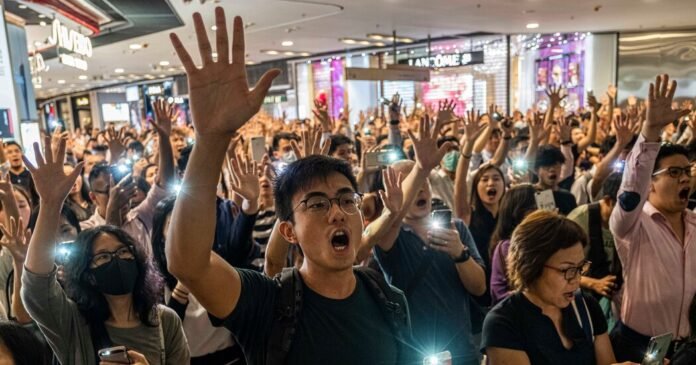[ad_1]
YouTube said on Tuesday that it would comply with a court order to block users in Hong Kong from viewing a popular democracy anthem, raising concerns about free speech and highlighting the increasing fraught environment for tech companies operating in the Chinese territory.
Last week, a Hong Kong court granted a government request to ban the song, “Glory to Hong Kong,” listing 32 links to videos on YouTube. Judges said the song was a “weapon” that could be used to undermine national security.
The court said the injunction was “necessary to persuade” technology companies to “remove” the songs from their platforms.
A representative of YouTube said in a statement that the company would “continue to consider” an appeal of the court’s ruling but would comply with the order.
“We are disappointed by the court’s decision but are complying with its removal order by blocking access to the listed videos for viewers in Hong Kong,” the representative said.
Like most tech companies, Google has a policy of removing or restricting access to material that is deemed illegal by a court in certain countries or places.
Last year, Google received 105 requests to remove content from its platforms, including YouTube, Google sites and its search service, according to the company’s transparency report. Six of those requests involved what the authorities said were national security threats.
In May 2023, Google said, it was asked to remove a Google Drive account that “appeared to encourage participants to submit videos of themselves singing “Glory to Hong Kong.’” Google did not comply with the request.
By blocking “Glory to Hong Kong” in the city, links to videos of the song would also stop showing up on Google search results in Hong Kong, according to the company representative.
Since demonstrations rocked the city in 2019, “Glory to Hong Kong” has been a flashpoint for the authorities who considered it an insult to China’s national anthem. The song has been banned from Hong Kong schools.
Beijing has asserted greater control over the former British colony in recent years by imposing a national security law that has crushed nearly all forms of dissent. People convicted of posting seditious content online have gone to prison.
In March, the Hong Kong government enacted new security legislation that criminalized offenses like “external interference” and the theft of state secrets, creating potential risks for multinational companies operating in the Asian financial center.
Compared to mainland China, where the internet is tightly surveilled and censored, Hong Kong is a relative bastion of freedom. Facebook and X have continued to operate in the city after they were blocked from the mainland in 2009. In 2010, Google shut down its China services and rerouted users to its search engine in Hong Kong.
Lokman Tsui, a research fellow in Amsterdam with The Citizen Lab, a cybersecurity watchdog group, said that the government was embarrassed by the popularity of “Glory to Hong Kong” and had gone to great lengths to ban the song.
“This injunction shows that Hong Kong is open for business but only if you are willing to comply with their requests for blatant political censorship,” he said.
YouTube’s decision raises questions about whether other platforms, such as Facebook, Instagram and Spotify, would be subject to similar pressures.
“After Google, the government will now begin to focus on other platforms like Meta where the protest songs can be also found on Meta’s Facebook and Instagram,” said George Chen, a co-chair of digital practice at the Asia Group, a consulting firm in Washington. ”I believe other platforms may now consider YouTube’s decision to geoblock as a good reference.”
Meta did not immediately respond to a request for comment. The Asia Internet Coalition, which represents Google and Meta among others, declined to comment on its member companies.
[ad_2]
Source link

